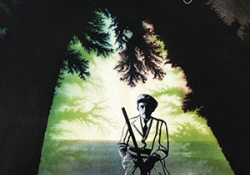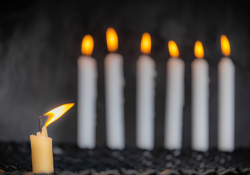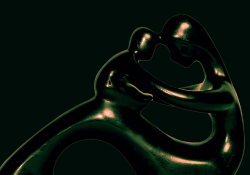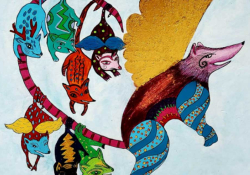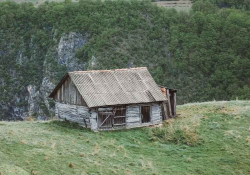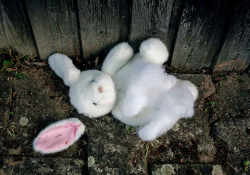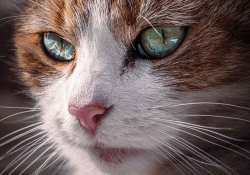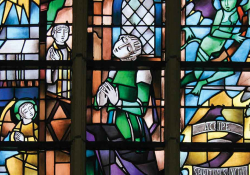Danube 1954
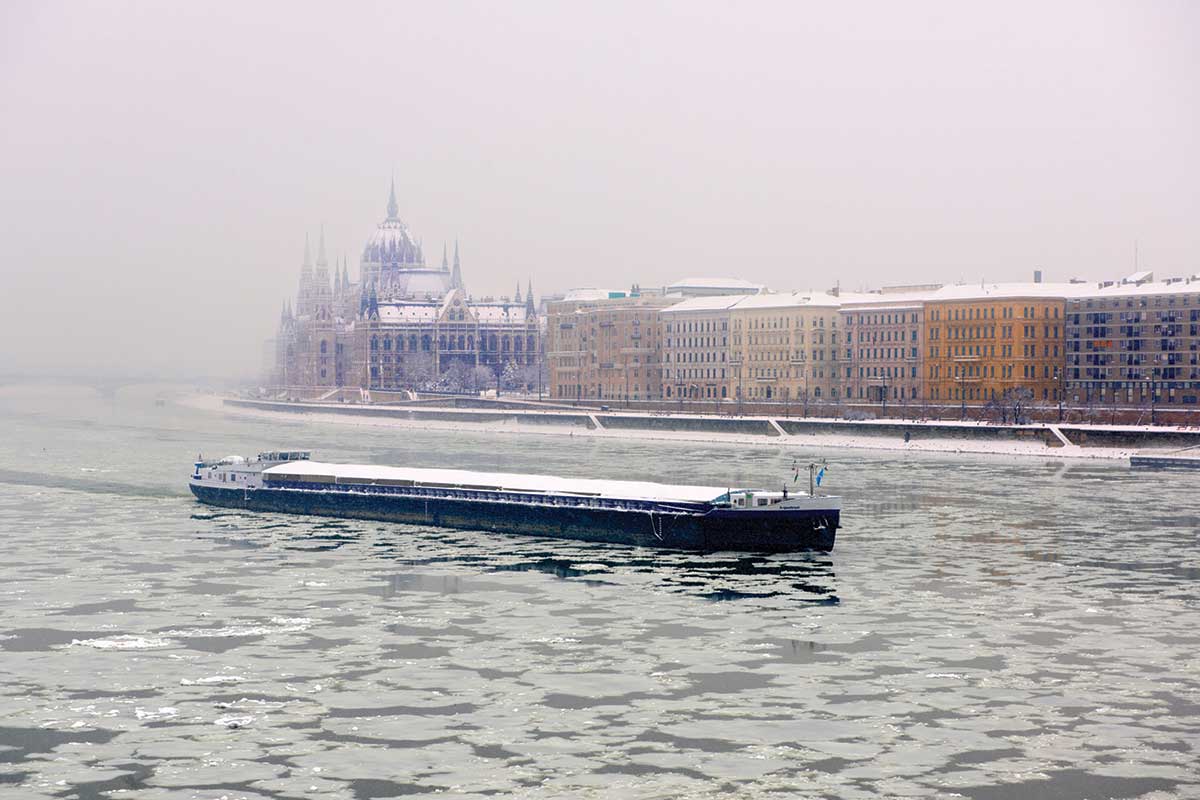
Along the shore of the Danube, a cat reflects on world history and human nature. From Oppenheimer to Donne to Stalin to Ana Pauker the musings glide, but of one thing this cat is sure: the problem with humans is that they meditate and stretch too little.
The Trinity test thunders across the sky, the anthropocene is about to begin. There is something new under the sun.
The humans drag a net ashore: there’s some runny, viscous flesh in it, not fish. Its eyes are open but it doesn’t look. The others gather around the prodigy, powwow about what on earth it is, where it comes from, and what it might taste like. I am cleaning myself, stretching: sooner or later I’ll get my share of it anyway.
Here, down by the quiet Danube, lots of things are dragged ashore. I was only one year old in my current life when the loud, stinky van brought a large group of humans. I can’t suffer this smoke-puffing thing of the humans, it took two of my lives already: although I could see the approaching lights, could hear that moronic sound and even smell the stench of gasoline, still it ran over me. And it keeps happening to the others as well. That’s it, let’s face it: what humans can’t judge is the right proportion between their own abilities and ambitions; we cats can’t judge speed accurately. So I chose to be reborn in such a place instead, where there are few cars, fewer roads, and next to no traffic. Only a cold war.
That’s it, let’s face it: what humans can’t judge is the right proportion between their own abilities and ambitions; we cats can’t judge speed accurately.
Life is of course a good deal rougher in such a place. If the population of humans is scarce and dirt-poor, then there are no garbage dumpsters, and if there are no garbage dumpsters, then what shall a freelancer like me find to eat? For each bite of mouse, vole, or sparrow I need to stay pitted on the lookout for hours. Not to mention the cold. Apart from two barracks there are no buildings at all, in the winter the Crivăț blows atrociously, at a higher speed than the cars that once hit me. With the sole difference that this speed has no weight, no object, nothing, you can’t tell where it comes from and where it goes. It’s pure speed.
But spring is fine. It drives me mad but it’s fine. And summer, summer is hyperfine. The delicious warm salty vapor that floats up, brought by the sea breeze, the lying in the sun and in the shade, the dolce vita, the luxuriously rotting matter. At such times I don’t miss anybody’s company, just keep watching from afar the undulating movement of the flock of humans, up to their thighs in the rice, how they cut the stems with a scythe and keep squealing, Jesus, a leech, they leash out left right and center, Jesus, a leech, leash out left right and center, but keep progressing indomitably in the rice all the same, for this is their share of the cold war.
In more serious places of course the politics of threatening is doing a roaring business: the film industry of good boys vs. bad boys, the nuclear Wimbledon. They see and they know who they shall side with, because it is shown to them and explained to them. In the background the setting: palm trees, rain forests, ice fields, oceans, all full to the brim with not exactly photogenic creatures who are to get the short end of it, but it’s hardly a discussion subject over there.
Here, on the other hand, where the Danube is preparing to flow into the sea, the toiling humans have no common views, only a common condition, for instance the fact that they are from Háromszék County, speak Hungarian, and they all used to own rather a lot of land before it was taken from them. They keep thrashing at the leeches, then after work they screech in the barracks whenever a mouse or rat happens to pass by. They have hardly one reasonable gesture. They’re really lost in space. They have no idea why they are here. They have no idea that they are here just like that.
The holocene came to an end when the humans worked out the potential to exterminate themselves, and went so far that they couldn’t come up with any other means to hinder their own extinction but the extermination of the whole planet. Clever. Of course each and every human got paranoid in a different way, but they only became really dangerous in large masses (although perhaps this is true of any living being capable of locomotion).
Only the trees, the plants, the stones never go mad.
We only do if we are not in a position to meditate.
The Danube used to flow through Budapest too when I lived there, it was a time when plenty of rats were squirming and swimming around. Come to think of it, we felines are strong swimmers too, but you can’t meditate with your fur dripping. Back to Budapest: the hot war was coming to an end, and still they kept slaughtering one another with machine guns, into the Danube. I’ve seen it. There were some who jumped into the icy Danube before the bullet came, and swam ashore. At such moments I felt a bit of respect for humans again. Because even if it’s raining, it’s good to be alive.
Basically the problem with humans is that they meditate and stretch too little. Their cubs are still relatively nimble, but the fully developed specimens are mostly stiff, angular, and gravitation takes hold of them to such extent that they’d swallow any inanity. Too bad. These ones here by the Danube live in utter ignorance, they haven’t even been duped, only dispossessed.
They have no inkling what changed more or less irrevocably some ten years ago. They have no idea that the whole story is long about something else than the question of who owns the land and who owns the tools, or the question of who is to live and who is to die, for everybody will die, the earth itself will die, the trees and plants will die, even mosquitoes will go extinct.
It’s true that you can’t see any trace of all this down here in the steppes of Dobrogea and in the floodplain of the huge quiet river: rice grows the same as before, the sparrows go on making a racket, the fish swim, the mosquitoes swarm at leisure. The sun rises in the morning and sets in the evening as it did before Copernicus.
They are cutting the rice and don’t know that there is something new under the sun.
They keep thrashing at the leeches and don’t know that there is something new under the sun.
They keep chasing the rats and don’t know that there is something new under the sun.
Strangely, they never try to drown in the Danube in the summer, only in spring and in the autumn.
Beczásy meditates and stretches almost as much as we do. Even though he doesn’t know about the Gadget, about the Little Boy and the Fat Man, but having covered his own Jornada del Muerto, he is no longer paranoid.
Because of the Crivăț we too, all twenty-one of us, gather in winter and ask to be let in the humans’ barracks. We are twenty-one because, although reproduction rates are high, dropout rates are also more or less high. Zina cooks corn mush for us, we catch a few mice on the side, sleep much, get by. Beczásy likes to count us when he puts out the mush for us in the plates. He meditates and stretches almost as much as we do. Even though he doesn’t know about the Gadget, about the Little Boy and the Fat Man, but having covered his own Jornada del Muerto, he is no longer paranoid. He hovers in sadness like the ones who have experienced that if you spin eastward for long enough, you will end up in the west, so death doth touch the resurrection.
The Trinity test was led by J. Robert Oppenheimer. He was in a turmoil over how felicitous it was that the explosion succeeded. Whether nuclear revenge could be ethical. He consoled himself with John Donne’s metaphysical poetry, according to which death alone can lead to resurrection. They had to put an end to Japanese death, that’s true, the Little Boy thundered across the sky and the mushroom appeared. Nothing remained of Hiroshima (except for six gingko trees). But why did they have to launch the Fat Man on Nagasaki? Oppenheimer didn’t want it to happen, but once launched, death spun out, ricocheting from resurrection; Hitler and his gang had long shot themselves in the head when bombs were getting ever more proficient as more and more money was put into them, and there came the cold war with the Soviets, and top-secret experiments bordering on fiction. Where have the holy rhymes gone? Today it’s raining in paradise.
Oppenheimer was partly accused of leaking information about the bomb to the Soviet secret services and partly accused that, tragic eejit as he was, he couldn’t possibly have imagined that scientific results would be hijacked by political interests.
I have frequently observed that most humans grow restless if they don’t understand something. Naturally, their restlessness manifests in aggression. This is also the reason why I avoid humans who reach out to me with baby talk. If I feel like getting stroked, or just want a bit of warmth, I pick the coldest and most impassive of them.
Beczásy didn’t tell a word to Zina about the interrogations, the torture, and about how they schlepped his dead-looking body by the feet with the intention of dumping it in a hole in the prison yard the next day. Outside the Crivăț was blowing, inside it was snug and warm, I made a place for myself right next to the fireplace, and Beczásy was in a reverie about the marvelous composition of the soil in Dobrogea, for the ashes of the burned-down reeds, together with the rotting roots, formed a 50–100cm layer of first-class humus; with a few waterpipes an irrigation system from the Danube could be set up; if paid a handsome fee, the girls from the neighboring villages would weed impeccably; sunflower and beans would do well on the sandy stretches of the floodplain, and tomatoes, peppers, gherkins, aubergines in the greenhouses, you could even try potatoes, although it is risky with the summer heat. Nobody had reasons to doubt his word, this is what he was thinking about, whereas I was thinking about the fact that this year the ex-finance minister was sentenced to death by his own pals, the one who used to go hunting to Beczásy’s place and about whom he was interrogated by the secret police screws. All in vain, because he knew nothing about Luka, except that he used to throw the bones under the dinner table, and that it was his polyglot Soviet wife who ratted him out. Anyway, this Luka was now penning his petitions for pardon to Gheorgiu-Dej from the penitentiary of Aiud, in the genuine spirit of communist, ehm, self-criticism.
My sweet comrade, my life and death I commend into your hands. I confess to, instead of Stalin who has already shut His eyes, you my soul’s comrade, that I have sinned by word, deed, and by consent, I lived in debauchery, as a result of which I contracted syphilis, lebrosy, and sabotage, but I am sincerely sorry, and let me the fuck out of here, you can’t be serious about this, may the Lord our God, the Son and the Party be with youse at all times. Gheorghiu-Dej threw out Luka’s letters unopened, changed the death sentence to life sentence, so he could pass his days with reasonably little torture in the homey penitenciary of Aiud. In contradistinction to Pătrășcanu, for instance, who was charged with being an armchair communist and a Titoist (just like László Rajk, executed five years earlier next door), so he was tortured, sentenced to death in a show trial, and killed. Today it’s raining in paradise.
Outside the Crivăț is blowing; the humans have wrapped around themselves every bit of rag they could when they were taken out to clean the ditches. They marched in Indian file on the embankment along the Danube, some had a spade, some a rake, in the front Dr. Miklós Sólyom was marching with a scythe. Even their faces were wrapped up. They kept laughing at themselves: here goes the death brigade. Then Beczásy got a horse from somewhere and from that day on he wouldn’t march with the death brigade but ride along on his horse called Puiu. Who on earth gave the name to the little horse? It was one of the nommes de guerre of Marcel Pauker, who was put away by the great Stalin in a show trial before the end of the war. There were rumors about Ana Pauker that she herself had shot her husband in the head in Stalin’s presence, but nothing quite squared in this account, apart from the symptoms of paranoia, of failing reasoning, of negative feelings, of the laying of the blame, and self-exculpation. In the world neatly divided into two, the good boys (aka the bad boys) also persecuted and tortured the good boys (aka the bad boys). According to the anecdote, Stalin asked Ana Pauker what they should do with traitors, and her answer was: Shoot them. Joseph Vissarionovich reached out his personal revolver to her, pointed at Marcel, Ana shot. In point of fact, when Marcel was executed in Moscow in Butovo on August 16, 1938, Ana was dumped in the Dumbrava prison, in Romania. Later on she would be the first woman to be appointed minister of foreign affairs. Then she was imprisoned again, together with Luka and Teohari Georgescu. Ana was minister of foreign affairs, Luka was the finance minister, Teo the interior minister: the holy trinity of Moscow agents. In the days when they were at the apex of their power, the masses used to express their spontaneous love for them in the rhyme: Ana, Luka, Teo, Dej / bagă spaima în burgheji. To give the bourgeois the creeps, well this is how the humans have achieved the idea, unquestionably worthwhile even from the feline point of view, of liberty, equality and fraternity. In addition, the fourth character of the little rhyme, Dej, who was no Muscovite, in time came to give the creeps to his comrades too, partly because he had realized their small differences, and partly because of his newfangled, unquenchable desire for total power. He found that there were plenty of traitors—not that he actually needed them for the task: for instance, Luka was ratted handsomely by his former hunting pal, Szenkovics. Today it’s raining in paradise. The creatures who meditate and stretch little, who can tell good from evil so scrupulously, blink innocently when they hear the word traitor: they are baffled, shaken, they throw tantrums, as though it had not been they themselves who had traded in the slogan liberty-equality-fraternity for hunting until you faint.
The three icebreakers approached on the frozen Danube, the noise was deafening, then suddenly water started ebbing away, for the ice slabs must have blocked the river completely at some point. If they had not done something about it, the village would have been completely flooded. Airplanes came, bombing the ice dam from above, one pilot, Jadran Danica, flew too close to the mass of ice and died in the explosion. This would have been his last flight on duty before being released from military service.
In line with the technique used by humans, he set about it with intimidation, so that the cub would develop failing reasoning, laying the blame, and self-exculpation. That is, the negative emotional disposition necessary for immeasurable evil.
I don’t know if he was the same Jadran Danica whom Beczásy’s elder daughter saved from drowning in the Danube one summer. Jadran went down to the riverbank with his father, it was glaring hot, the crickets were chirping, the mosquitoes were buzzing, the tomatoes, peppers, and watermelons were ripening, Beczásy was busy getting things organized on horseback, Zina was smoking, with her this was a form of meditation, which is fine by me, and Lilian, who had been living with them for two years already because they kicked her out of school as a class enemy, walked down to the Danube to swim. Jadran Danica’s father wanted to teach his son to hunt: more than that, to hunt boundlessly. In line with the technique used by humans, he set about it with intimidation, so that the cub would develop failing reasoning, laying the blame, and self-exculpation. That is, the negative emotional disposition necessary for immeasurable evil.
Although the little boy was an able swimmer, this wasn’t of much help to him when his father, a fat man, cruelly pushed his head under the water, as though he were playing. Suddenly he didn’t pop up anymore. His father didn’t expect such a turn of events: he didn’t want to strangle him, only to crush his self-confidence. As soon as he realized what happened, he cried out for help. Lilian had seen the whole procedure, walked into the river, dived, and, embracing him with one arm, dragged the child ashore. There she pumped water out of him, Jadran Danica came to, while his father sat slumped on the ground, baffled, shaken, his head hanging between his drawn-up knees. Today it’s raining in paradise.
At the onset of the cold war Time magazine featured the picture of Ana Pauker on the cover of its September 20, 1948, issue. In those days she ranked as one of the world’s most influential women. The title ran “A Girl Who Hated Cream Puffs.” It didn’t say a word about what it was like to grow up in Bucharest when the law didn’t allow her to go to school, what it was like to save Jews during the pogroms: the aim was to offer a monster to the civil, cream puff-loving eyes of the readers.
Beczásy’s younger daughter, who was starving most of the time, being reduced to stealing bread from the shop, received a small sum of money on the first of every month; she would go straight to the confectionery and ask for three bombs, those artificially colored, creamy, sickeningly sweet cakes. The little abandoned girl had to fight back her nausea, but once a month stuffed them all into her mouth. This of course I have hardly any means of knowing here, in icy Dobrogea, in the company of Beczásy and Zina, so nothing can stop me from naming the cakes that little Tanietchka gorged on once a month the Gadget, the Little Boy, and the Fat Man.
There was a joke about someone calling Radio Yerevan:
Could you please tell me why Ana Pauker is walking with an umbrella on the streets of Bucharest in broad sunshine?
Certainly we can: because today it’s raining in Moscow.
Today it’s raining in Congo, in Monrovia, in Baghdad, Falluja, in Jerusalem, Guinea-Bissau, today it’s raining.
I too was saved by the sex bomb a few years later, in Rome. I was a tiny abandoned kitten shivering on the streets alone, when she came by with her dancing gait, with her blond mane, in her gown with the long train; she placed me on her head and laughed. Then she spotted the Trevi fountain, today it’s raining in paradise, she put me down and waded into the water, and never as much as turned around for all my mewing.
Translation from the Hungarian
By Erika Mihálycsa


